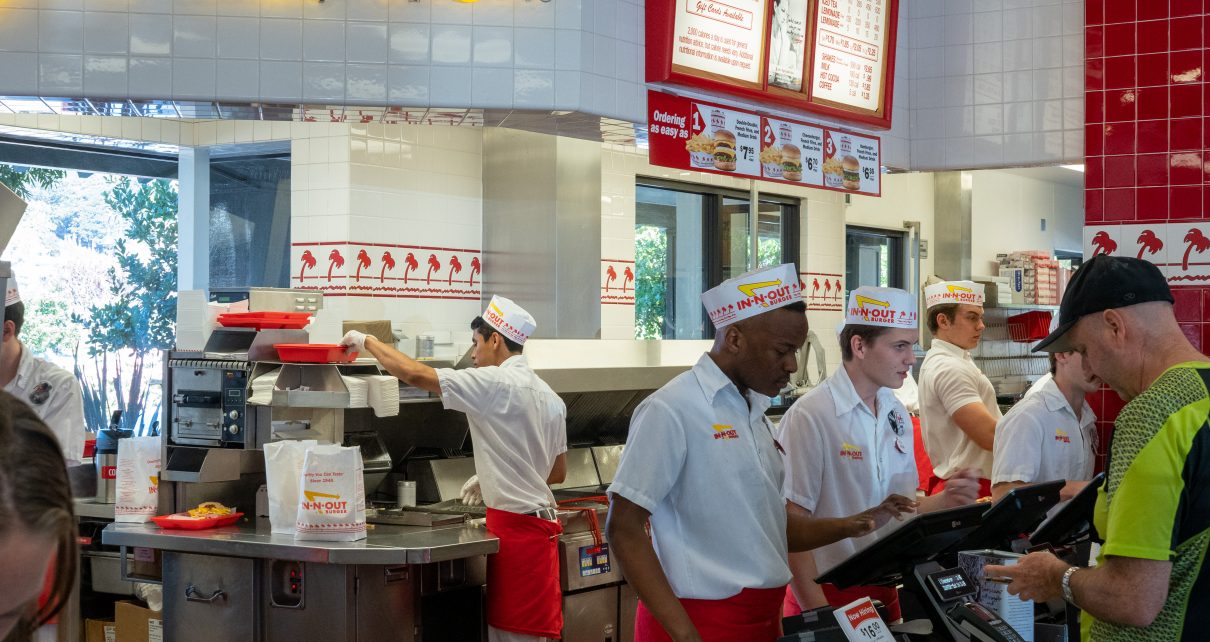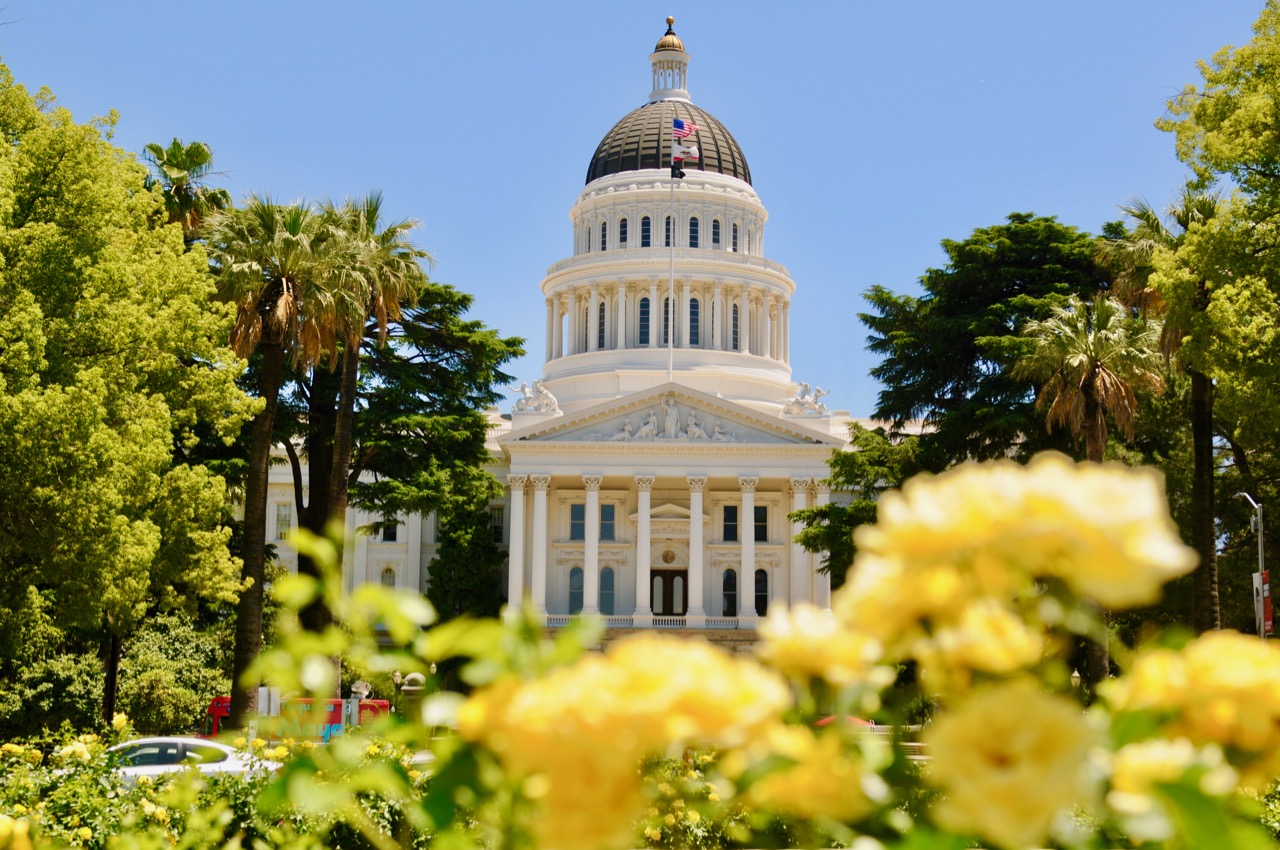
Mill Valley, CA: Workers at In-N-Out location behind counter take orders. (Photo: David Tran Photo, Shutterstock)
AB 257 or Reversal: Fast Food Workers Weigh in on the New Fast Food Council Law
The worker shortage made employees more powerful in demanding higher pay or more flexible hours
By Evan Symon, September 8, 2022 7:08 pm
Following a tumultuous week for the fast food industry in California, many fast food workers tell the Globe what they really want.
The AB 257 law, authored by Assemblyman Chris Holden (D-Los Angeles), was signed into law by Governor Gavin Newsom on Monday. The new law will create a Fast Food Council of 10 members comprised of worker’s delegates, employer’s representatives and state officials and would set minimum wages, working conditions, and set hours for fast food employees in the state, including a hoped for $22 an hour wage.
However, only a few days later, that law was in jeopardy. A coalition of restaurants, known as the Protect Neighborhood Restaurants, filed a referendum request on Wednesday. Should it be accepted, the new law would be halted while opponents collect signatures to place the question of establishing the Council before California voters. If enough are collected, the law would be further delayed until around the fall of 2024, when it would be voted on. Supporters of the bill fired back, and today, the issue is starting to divide many Californians.
Caught in the middle of all of this are the fast food workers. Some are all in favor of the Council. Others, who only work part time, don’t like that many provisions may not cover them. Still others rallied against set working times and said they would rather work with their managers directly instead of a Council.
Throwing additional chaos into the situation is an overall worker shortage that already made employees more powerful in demanding higher pay or more flexible hours. With many employees already getting roughly what they wanted, they see the Council as something that could actually walk back some of the gains they received all on their own.
Several workers contacted the Globe Wednesday night and gave an overview of how the field was really laid out following those huge announcements during the week.
“The reality of the situation is that a lot of us are full-time employees working shifts for pay we have been negotiating since COVID,”said Amani Thomas, a Burger King worker, to the Globe. “When more people started leaving afterwards, due to going to school or because they found a better paying job, the rest of us used that as leverage. Using that, the full-timers managed to get new hours. For me, I made it so I have off when bringing back my kids to and from school, but also early hours off on Sunday for church. The other positions were filled in by part-timers, mostly high schoolers and people in-between jobs.”
“We also got higher pay. Like for me, I’m known as being the best at the register and my boss didn’t want to see me go. So I got a bump in pay, especially after I noted that I help train many of them and without me doing that it would take a lot longer to do. Fast food places are set up so that someone can be quickly trained for the jobs needed, but it’s not exactly easy street either. Like, you wouldn’t believe a lot of the skills required for some of this.”
“And with higher pay, we can work out better health care plans, even if through Covered California, start our own retirement accounts, etc. If the Council was put into place, we’d lose a lot of what we gained here. A lot of us are already working with management over all this. We know they need to make a profit, especially if we don’t want the place to close down and put us all out of work, but we also know how much we are worth. It’s good where it is now for many of us.”
The New Equilibrium
Others also noted the new equilibrium.
“Before COVID, you know, conditions were bad, pay was low, and a lot of us were working two jobs due to cutting us off an hour short of being full-time,” said Manny Lobos, a fast food worker in the Central Valley, in a Globe interview. This Council goes the other way, taking away our individual needs and having a few people set up what is needed across the state. There is a LOT of differences that the Council will not get. Like how higher pay is needed in more urban areas where things like rent and food are more expensive. Or how different people need different hours. A McDonalds in a downtown area will be very different to one right next to a College, as many workers will want odder hours to work around classes. A McDonalds in a community of older workers might want earlier times to work in their schedules.”
“We need to get past where we were before all this, but the Council is not the answer. You had some loudmouth workers demanding this, but all they saw was the higher pay and they were aboard. They don’t know fully what the implications of this are.”
A third worker, who wished to remain anonymous, simply told the Globe that “Neither the bill signing on Monday or the attempted block of it on Wednesday will benefit us. Can’t ya’ll let us do our own thing? We just need to work with each other over this away from all of this politicking.”
The Secretary of State’s decision over the referendum request is due soon.
- Bill to Require Law Enforcement Disclosure if AI Was Used To Help Write Reports - August 7, 2025
- Gov. Newsom Files FOIA Request To ‘Expose True Cost’ Of L.A. Federal Troop Deployment for Anti-ICE Riots - August 6, 2025
- California Redistricting: How Newsom’s Plan Will Demolish Hard Fought GOP Gains - August 6, 2025





Great article! Thank you for it.
“We also got higher pay. Like for me, I’m known as being the best at the register and my boss didn’t want to see me go. ….. you wouldn’t believe a lot of the skills required for some of this.”
From that quote, this person fails to look at what will happen if Fast Food places are dealt with gov’t interference and have to raise pay to level that challenge the system.
This will SPEED UP the robotic automation to take those jobs and those robots will have multi-skills where the “skills” that the quote mentions will be vast superior and more efficient and not ask for $22/hr or vacation time.
The future will become walk into a fast food place order from a kiosk with nice pictures, put in money needed to cover then robots will cook and serve the product to customer flawlessly and adapt to specifics such as extra mustard, extra pickles and no onions without thinking “complicated order”.
In the drive through will use a combination of touchpad kiosk or voice entry systems and the drive through window will already have your order as you pull through as the system of robots will be able to negotiate order through systems.
Meanwhile these “workers” will wonder why they no longer have a job as Democrats will pitch its the billionaire owners that forced you out, while ignoring the obvious who did it to them was actually bills like this.
“We also got higher pay. Like for me, I’m known as being the best at the register and my boss didn’t want to see me go.”
There you go. Pay based on merit. Exactly the opposite of what the Democrats and unions want.
“We need to get past where we were before all this, but the Council is not the answer. You had some loudmouth workers demanding this, but all they saw was the higher pay and they were aboard. They don’t know fully what the implications of this are.”
^^^ There they are – your Democrat voting base…. pop off with an emotional response to a perceived “injustice” and implications be damned…. just remember, fast-food workers – it was your Democrat “saviors” that screwed you out of a job…. STOP VOTING FOR DEMOCRATS – THEY LIE TO YOU CONTINUALLY….
When the minimum wage is increased, the only winner is the tax collector, and maybe the politician who’s stumping for votes. When wages go up, so does everything else, making that increased wage worth much less, if anything, but you’re paying the tax on the higher amount. Further, the customer base shrinks due to people either not being able to afford the meal, or just not wanting to spend that much. CA legislators just don’t have the intellect to think beyond their nose! They sure aren’t helping anyone but themselves.